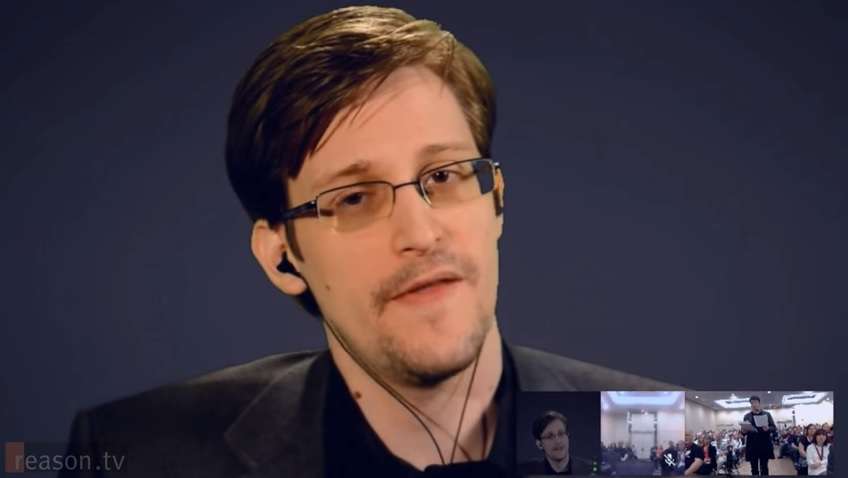Another Reason to Praise Snowden: He Sped Up Encryption Development
The NSA laments what is a positive development for individual privacy and security.


This morning Edward Snowden was blamed for accomplishing yet another thing for which he should actually be praised. At a breakfast sponsored by the Christian Science Monitor, Director of National Intelligence James Clapper said that Snowden's surveillance leaks have prompted a massive push to improve encryption. The result? Data encryption is seven years ahead of where it would have been had Snowden kept his big mouth shut.
This is something about which Clapper said, "From our standpoint, it's not a good thing":
New, commercially available encryption software "had and is having major, profound effects on our ability" to collect intelligence, "particularly against terrorists," he warned.
That's in large part because the Islamic State is "the most sophisticated user by far of the Internet." They privately purchase software that "to ensure end-to-end encryption" of their communications.
"And so that is a major inhibitor to discerning plotting, principally by ISIL and others," Mr. Clapper said, using one acronym for the Islamic State.
I suspect a little bit of exaggeration here and that ISIS is not, indeed, the most sophisticated user "by far" of the Internet. If nothing else, we would hope that Clapper's own employees at the NSA are actually more sophisticated users. If not, strong encryption is the least of our problems.
The improvement of cybersecurity for tech users is undeniably a net good for everybody. It's typical government authoritarian logic to fret that the problem with individuals having tools that protect themselves is that bad people will use these tools to protect themselves as well. The solution for some—whether we're talking about encryption, or guns, or even money to pay for attorneys—is to prohibit or seriously weaken everybody's access to these tools with vague, unsupportable claims that they'll help prevent violence or help fight crime. For folks like Clapper, his priority is getting access to every single piece of information that exists in the world by any means possible. Whether bad things could possibly happen to you as a result of your data protection being weakened is a "you problem" not an "NSA problem."
Clapper, as we've seen from this administration, is quick to invoke the mysterious "balance" of issues:
Clapper for his part echoed President Obama's warning against "absolutist positions" on the topic. "Somehow, we need to find a balance here," he said. "I don't know the technicalities of how we might arrive here, how we thread the needle" between how to "ensure privacy and security on an individual basis, as well as security in the context of what's best for the collective good."
The problem with these calls for "balance" is that, despite the veneer of moderateness, it's an unprincipled grasp for control. When an official says that there needs to be a balance, it's a denial in the idea that a constitutional principle or civil liberty should be the restraining force on authority. Instead, liberties and authorities are portioned out like peas and carrots by the lunch lady at the school cafeteria.
But never forget that the lunch lady is in the employ of the government, the side that relentlessly pushes for more "authority." As such, efforts at a solution to this "balance" will be that government officials will attempt to grab as much as they can. Whatever balance that protects liberty or privacy will amount to whatever influence outside forces (with the help of a handful of like-minded legislators) will be able to eke out. In the end the balance will be determined by those who pass the law or approve the regulation: the government.
Thus, we end up with the absolutely horrendous first attempt at a federal encryption law by Sens. Dianne Feinstein (D-Calif.) and Richard Burr (R-N.C.). There is no "balance" to be found in their bill. It's all authority, through and through. When the government demands information about your data, and a court approves it, tech companies are obligated to provide it, encryption be damned. There is no liberty or privacy to speak of. And so the "balance" in this fight—assuming that Congress won't stop until it passes some form of legislation—will be a fight to get privacy protections added.
This idea of "balance" itself subverts the concept that what the Constitution is supposed to do is limit government authority. What is presented by President Barack Obama and other government officials assumes that the two sides are two be treated equally, when in fact the balance was originally designed to limit the side represented by folks like Clapper, Feinstein and Burr.
Below, watch Reason's Nick Gillespie interview Snowden:
Editor's Note: As of February 29, 2024, commenting privileges on reason.com posts are limited to Reason Plus subscribers. Past commenters are grandfathered in for a temporary period. Subscribe here to preserve your ability to comment. Your Reason Plus subscription also gives you an ad-free version of reason.com, along with full access to the digital edition and archives of Reason magazine. We request that comments be civil and on-topic. We do not moderate or assume any responsibility for comments, which are owned by the readers who post them. Comments do not represent the views of reason.com or Reason Foundation. We reserve the right to delete any comment and ban commenters for any reason at any time. Comments may only be edited within 5 minutes of posting. Report abuses.
Please to post comments


Praise be to Thee, O Snowden!
Government Almighty BLESS you, Edward Snowden!
Ye are a HERO, seriously!!!
(Guv Almighty will use the likes of YE to justify spying yet more on the rest of us, but, ya know, it wouldn't be fair to blame the Jews for the excesses of Hitler, either). Ya MADE us do it, dammit!!!! We had NOOOO other choice!!!!
Mister Snowden very bad man, very very bad man! *wags finger in Snowden's direction*
Appropriate.
http://www.hasjamesclapperbeenindictedyet.com/
I suspect a little bit of exaggeration here and that ISIS is not, indeed, the most sophisticated user "by far" of the Internet. If nothing else, we would hope that Clapper's own employees at the NSA are actually more sophisticated users. If not, strong encryption is the least of our problems.
Who's we? I suspect once in a while they accidentally let the truth slip out and admit they're dumber than a box of hammers. But as long as they've got a box of hammers to threaten you with, they don't have to be smart.
SNOWDEN FOR PRESIDENT!!!!
The latest Snowden tweet:
hacked into the nba computers to get a tip on who they'll fix to be champion lol
#puttingallmyrublesontheclippers
"I don't know the technicalities of how we might arrive here, how we thread the needle" between how to "ensure privacy and security on an individual basis, as well as security in the context of what's best for the collective good."
With all due respect, Mr. Clapper, you're only the *Director of National Intelligence*.
This stuff is above your pay grade.
Sounds to me like "ensuring privacy and security on an individual basis" is "what's best for the collective good".
Fuck off, slavers.
Anyone remember Anon E. Mouse?
Almost certainly an NSA shill, came here vigorously attacking Mr. Snowden right after the initial revelations, got his ass whupped royally by yours truly, haven't seen hm since.
In the unlikely event he actually believed all that shit, I wonder if he ever came to his senses, and at what point did he have his "aha moment."
If nothing else, we would hope that Clapper's own employees at the NSA are actually more sophisticated users.
"So, Mr. Clapper, am I to understand that the NSA is getting its ass handed to it by a bunch of goat herders? Maybe we need to take another look at your budget . . . "
RE: Another Reason to Praise Snowden: He Sped Up Encryption Development
Other reasons to praise Snowden:
1. He made it plain once and for all that Amerika is not a free country.
2. He now lives in a country that spies on its people but makes no bones about it.
3. The powers that be in Amerika want him dead.
4. Snowden had the guts to do what was right.
Amen, Jay-Dude Sir!
Most of us want to have good income but don't know how to do that on Internet there are a lot of methods to earn money at home, so I thought to share with you a genuine and guaranteed method for free to earn huge sum of money at home anyone of you interested should visit the site. More than sure that you will get best result.T---03
--------- http://www.WorkProspects.com
...the Islamic State is "the most sophisticated user by far of the Internet."
Holy cow, I am definitely calling ISIS next time my router goes down then.